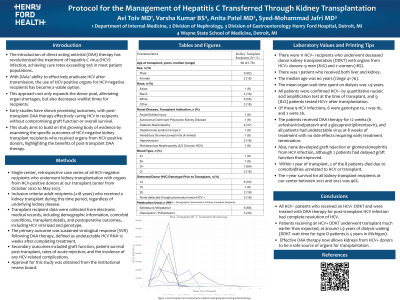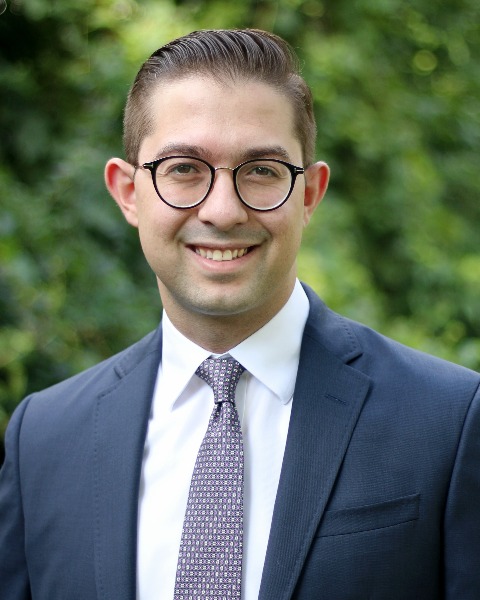Monday Poster Session
Category: Liver
P2882 - Protocol for the Management of Hepatitis C Transferred Through Kidney Transplantation
Monday, October 28, 2024
10:30 AM - 4:00 PM ET
Location: Exhibit Hall E

Has Audio

Avi Toiv, MD
Henry Ford Hospital
Detroit, MI
Presenting Author(s)
Avi Toiv, MD1, Varsha Kumar, BS2, Anita Patel, MD1, Syed-Mohammed Jafri, MD3
1Henry Ford Hospital, Detroit, MI; 2Wayne State University School of Medicine, Detroit, MI; 3Henry Ford Health, Detroit, MI
Introduction: The effectiveness of direct-acting antiviral (DAA) drugs for treating hepatitis C virus (HCV) infection may substantially increase the number of available organs for transplants by allowing organ transplantation from HCV-positive (HCV+) donors into HCV-negative (HCV–) recipients. This study describes the outcomes of HCV– recipients who received kidneys from HCV+ donors, highlighting the benefits of post-transplant DAA therapy.
Methods: This was a single center retrospective case series of all HCV– recipients who underwent kidney transplantation with organs from HCV+ donors at our transplant center from October 2020 to May 2023.
Results: There were 11 HCV– recipients who underwent deceased donor kidney transplantation (DDKT) with organs from HCV+ donors: 9 men (82%) and 2 women (18%). There was 1 patient who received both liver and kidney. The median age was 60 years (range 41-76). The mean organ wait time spent on dialysis was 1.9 years. All patients were confirmed HCV– by quantitative nucleic acid amplification test at the time of transplant, and 9 (82%) patients tested HCV+ after transplantation. Of these 9 HCV infections, 6 were genotype 1a, 1 was 1b, and 2 were 2b. Notably, 8 of these 9 patients received DAA therapy for 12 weeks (6 sofosbuvir/velpatasvir and 2 glecaprevir/pibrentasvir), and all 8 patients had undetectable virus at 8 weeks of treatment with no side effects requiring early treatment termination. Also, none developed graft rejection or glomerulonephritis from HCV infection, although 2 patients had delayed graft function that improved. Within 1 year of transplant, 2 of the 8 patients died due to comorbidities unrelated to HCV or transplant. The 1-year survival for all kidney transplant recipients at our center between 2021 and 2022 was 96%.
Discussion: All HCV– patients who received an HCV+ DDKT and were treated with DAA therapy for post-transplant HCV infection had complete resolution of HCV. Patients receiving an HCV+ DDKT underwent transplant much earlier than expected, at around 1.9 years of dialysis waiting (DDKT wait time for type O patients is 5 years in Michigan). Effective DAA therapy now allows kidneys from HCV+ donors to be a safe source of organs for transplantation.
Disclosures:
Avi Toiv, MD1, Varsha Kumar, BS2, Anita Patel, MD1, Syed-Mohammed Jafri, MD3. P2882 - Protocol for the Management of Hepatitis C Transferred Through Kidney Transplantation, ACG 2024 Annual Scientific Meeting Abstracts. Philadelphia, PA: American College of Gastroenterology.
1Henry Ford Hospital, Detroit, MI; 2Wayne State University School of Medicine, Detroit, MI; 3Henry Ford Health, Detroit, MI
Introduction: The effectiveness of direct-acting antiviral (DAA) drugs for treating hepatitis C virus (HCV) infection may substantially increase the number of available organs for transplants by allowing organ transplantation from HCV-positive (HCV+) donors into HCV-negative (HCV–) recipients. This study describes the outcomes of HCV– recipients who received kidneys from HCV+ donors, highlighting the benefits of post-transplant DAA therapy.
Methods: This was a single center retrospective case series of all HCV– recipients who underwent kidney transplantation with organs from HCV+ donors at our transplant center from October 2020 to May 2023.
Results: There were 11 HCV– recipients who underwent deceased donor kidney transplantation (DDKT) with organs from HCV+ donors: 9 men (82%) and 2 women (18%). There was 1 patient who received both liver and kidney. The median age was 60 years (range 41-76). The mean organ wait time spent on dialysis was 1.9 years. All patients were confirmed HCV– by quantitative nucleic acid amplification test at the time of transplant, and 9 (82%) patients tested HCV+ after transplantation. Of these 9 HCV infections, 6 were genotype 1a, 1 was 1b, and 2 were 2b. Notably, 8 of these 9 patients received DAA therapy for 12 weeks (6 sofosbuvir/velpatasvir and 2 glecaprevir/pibrentasvir), and all 8 patients had undetectable virus at 8 weeks of treatment with no side effects requiring early treatment termination. Also, none developed graft rejection or glomerulonephritis from HCV infection, although 2 patients had delayed graft function that improved. Within 1 year of transplant, 2 of the 8 patients died due to comorbidities unrelated to HCV or transplant. The 1-year survival for all kidney transplant recipients at our center between 2021 and 2022 was 96%.
Discussion: All HCV– patients who received an HCV+ DDKT and were treated with DAA therapy for post-transplant HCV infection had complete resolution of HCV. Patients receiving an HCV+ DDKT underwent transplant much earlier than expected, at around 1.9 years of dialysis waiting (DDKT wait time for type O patients is 5 years in Michigan). Effective DAA therapy now allows kidneys from HCV+ donors to be a safe source of organs for transplantation.
Disclosures:
Avi Toiv indicated no relevant financial relationships.
Varsha Kumar indicated no relevant financial relationships.
Anita Patel indicated no relevant financial relationships.
Syed-Mohammed Jafri: Gilead, Takeda, Abbvie, Intercept, VectivBio – Advisor or Review Panel Member, Speakers Bureau.
Avi Toiv, MD1, Varsha Kumar, BS2, Anita Patel, MD1, Syed-Mohammed Jafri, MD3. P2882 - Protocol for the Management of Hepatitis C Transferred Through Kidney Transplantation, ACG 2024 Annual Scientific Meeting Abstracts. Philadelphia, PA: American College of Gastroenterology.

